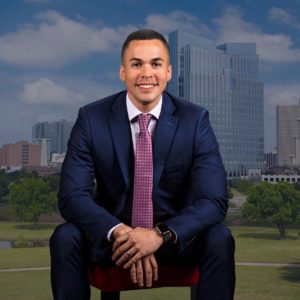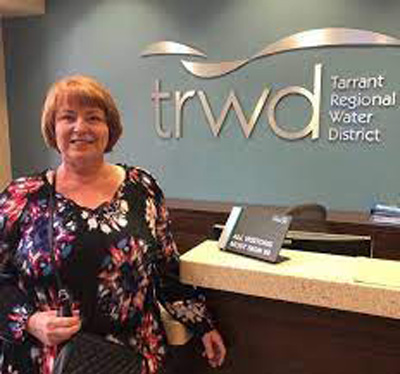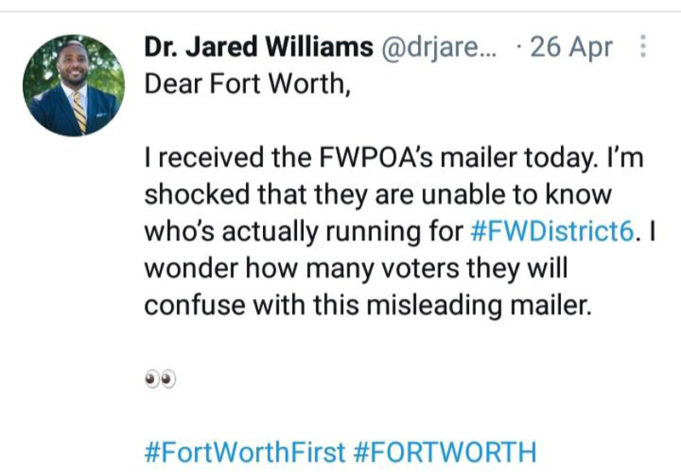With five strong mayoral candidates that included two city councilmembers, a runoff election for Fort Worth’s top office was always likely if not inevitable. Tarrant County Democratic Party Chair Deborah Peoples took in 22,352 votes, which amounted to roughly one-third of the ballots counted, while Mattie Parker, former chief of staff for city council and the mayor, came in a close second with 20,501 votes. Councilmembers Brian Byrd and Ann Zadeh earned 15% and 9% of ballots cast, respectively. Local business owner Steve Penate, who was largely unknown in local political circles, surprised many by pulling in around 9% of the votes for mayor.
Tarrant County voter turnout reached 13.4% of registered voters, up from 8.35% in 2019, when Fort Worth’s current city council was elected or reelected. Early voting accounted for nearly 92,000 of 157,194 ballots cast.
Fort Worth’s mayoral election is officially nonpartisan, but right-leaning voters are likely to continue supporting Parker, who has earned endorsements from Mayor Betsy Price and the Fort Worth Police Officers’ Association, while Peoples can reasonably expect progressive-minded locals to support her at the polls once again. The runoff election will be Sat., June 5.
In an email, Peoples said she is looking forward to the weeks ahead and making her case that 30 years of executive experience and a lifetime of public service make her the best candidate for mayor.
“We are a truly grassroots campaign,” she continued, with “the most voters on Election Day and the most supporters throughout the race. I see myself as the candidate in the strongest position to use my executive experience to sell our city, heal our longstanding divisions, and make sure we all benefit from our historic growth. We’re seeing such an outpouring of support with volunteer signups and grassroots supporters, and that’s a testament to the strength of our message of uniting our city into One Fort Worth.”
Parker said she is going to continue reaching out to voters through positive campaigning.
“Only by working together can we keep Fort Worth the best place in America to raise a family, grow a business, or enjoy retirement,” she said in an email. “The inclusivity of our campaign has been one of our biggest strengths — a team of diverse community and business leaders all working together for a safer and more prosperous future for every family. Because of our positive campaign, our fundraising has certainly benefited, but, more importantly, the grassroots outreach of our campaign is being driven by countless volunteers who are inspired by our message of uniting people to accomplish great things for our future.”
Fort Worth City Council Race and Runoffs
All eight city council seats were recently up for grabs. District 2 voters reelected Councilmember Carlos Flores, who earned 65% of Northsider votes. Jen Sarduy, who made social and economic justice central to her campaign, came in second at 17%.
When Byrd ran for mayor, he left the District 3 race without an incumbent candidate. Michael Crain, Byrd’s district director, will soon represent the district, which includes swaths of West and Southwest Fort Worth. Crain earned just over 71% of 11,400 votes cast.
Business owner Cary Moon will continue to represent the Alliance area of Fort Worth after taking in 51% of District 4 votes. Around 28% of votes went to Tara Wilson, who offered a socially and economically progressive alternative to Moon.
Gyna Bivens handily earned another two-year term as District 5’s councilmember after pulling in 63% of ballots cast in her Eastside district.

Photo courtesy of Twitter.
Councilmember Jungus Jordan, who has represented District 6 since 2005, will face Jared Williams in the June 5 runoff. Public outrage over a police union flyer may bolster Williams’ chances of unseating Jordan, the police union’s favored candidate. In late April, District 6 voters received a flyer that endorsed Jordan and listed four candidates who were not seeking public office at the time. Tiesa Leggett, one of three candidates at the time, was left off the political ad entirely. Fort Worth Police Officers’ Association president Manny Ramirez told the Star-Telegram that the flyer was a mistake.
“Omitting me was a way to mute me BUT I AM HERE,” Leggett wrote on Facebook in response to the patently false and misleading flyer. “This flyer speaks volumes about the exclusionary climate of our community.”
Jordan’s office did not return my phone call. Fort Worth’s police union also declined to respond to my questions.
“With everything that has happened in this city, state, and country over the past year, we have a fundamental obligation to speak up when we see blatant disinformation in our democratic process,” Williams said in an email. “Not only did Fort Worth POA list people on their mailer who were not on the ballot, but more importantly, they showed a disregard for Black women in our city by deliberately leaving Tiesa Leggett off the list of candidates. All candidates, PACs, and other organizations that choose to participate in our political process have a civic duty and moral responsibility to present the truth. When they choose not to, they harm voters and should be held accountable. This is why I signed and fully support the Code of Fair Campaign Practices and will pursue ethics reforms as a member of the council. On June 5th, the voters will decide who they want to be their representative. I hope to earn their vote.”
After District 7 Councilmember Dennis Shingleton announced his retirement from public office in January, three frontrunners sought the district that includes Arlington Heights, and two conservative candidates are now in a runoff.
Leonard Firestone, co-founder of TXWhiskey, has the endorsement of Mayor Price and outgoing councilmember Shingleton. Firestone lists his top issues as lower homeowner property taxes, safe neighborhoods, and traffic mobility. Business consultant Zeb Pent is a proponent of fiscal responsibility and an outspoken critic of gender expression. Five years ago, he blasted Fort Worth school leadership for allowing students to use the restroom of their self-identified gender. Firestone and Pent will compete for the District 7 seat on June 5. Neither remaining candidate responded to my requests for comment on their campaigns. A cursory glance at Pent’s active Twitter page (@ZebPent) shows that he frequently retweets bogus claims of a stolen 2020 presidential election and other right-wing conspiracy theories.
“Zeb Pent is unquestionably dangerous to our city,” said Lee Henderson, who came in third at the polls. “His lack of Fort Worth values makes him the wrong choice in this race and for public office altogether.”
District 8’s runoff will pit Christopher Nettles, a community leader and small business owner, against incumbent Kelly Allen Gray, who marginally led Nettles 46% to 43.5%.
District 9, which encompasses downtown, the Near Southside, and parts of South Fort Worth, was arguably the most contentious race. Political newcomer Jordan Mims, a queer Black waiter, launched a grassroots campaign that called for social justice and police reforms. He earned just over 9% of District 9 votes while Ricardo Avitia, founder of Hemphill No Se Vende (Hemphill Is Not for Sale), took in just over 3% of votes tallied. The runoff pits lawyer and U.S. military veteran Elizabeth Beck (43%) against community leader and active Texas Army National Guard member Fernando Peralta (12.5%).

Courtesy of Elizabeth Beck
Beck said in a phone interview, “We are keeping our foot on the gas, talking to voters, and knocking on doors.”
If elected to represent District 9, Beck said her priorities would be to create “good jobs and to make sure the city focuses on bringing back our economic base. We need to bring our tax base back. The city took a hit with COVID. I can make sure that every child has what they need to be successful when they go to school. We should invest equitably around District 9 by creating a culture that truly celebrates our diversity and lifts up our communities of color [so] they are at the table and opportunity exists for every child in this city, regardless of neighborhood and ZIP code.”
Beck said parts of this city, like the communities that founded Hemphill No Se Vende, feel left out of the local political process.
“The reason there is distrust with the city is that we have not done a good job of meeting the communities where they are at,” Beck said. “We expect engagement to look the same across the city. That’s not practical. What works for one neighborhood doesn’t necessarily work in the next. We need a councilperson who understands that. Instead of telling [those communities] what to do, work with them and find out what they need. Development of [the Hemphill] corridor is going to happen regardless. When you have high property values next to low property values, what happens? Do we want to shape that in the way that is most beneficial to the community? For me, that answer is yes. We need to make sure we are ensuring that very vibrant, generational communities are not being uprooted for investment purposes.”
Beck said she chose to run for city council because she saw the chance to drive drastic change in Fort Worth.
“There is an opportunity for us to pivot as a city and decide where we want to go,” Beck said. “My sincere hope for the city is that this new leadership is committed to Fort Worth.”
Peralta said the runoff is allowing him to get his message out.
“I think this go around, now that it’s just Elizabeth and me, there is less noise,” Peralta said in a phone interview. “With so many candidates in the race, it was hard to separate myself from the other ones.”
Peralta lists his top priorities as COVID-19 recovery, development and transportation, and racial healing.

As councilmember for District 9, I will “talk to small businesses and communities,” he said. “Some businesses were not able to get grant money because they weren’t registered properly.
I think we need to take a better approach to transportation. We have a city whose average age is 34 to 35. You want to have a city that is young and vibrant. As our city grows, development needs to be equitable. I’ve been involved in the Hemphill Corridor and groups like Hemphill No Se Vende. We all want the same thing, which is a thriving South Side. What are we doing to bring all these groups to the table while making sure everyone gets a piece of that pie? When we talk about issues in our police department, we need to make sure that we are inclusive and talking about the issues that affect our community.”
Peralta said he is confident that District 9 voters will support his campaign because he was been active in the South Side area as a community leader and volunteer for years.
Fort Worth School Board Results and the Race for Texas’ 6th Congressional District
In February, U.S. Rep. Ron Wright died from complications related to COVID-19. His widow, Susan Wright, entered the Congressional race along with 22 other candidates. While official elections results are still pending, Wright and state Rep. Jake Ellzey (both Republicans) are slated to compete for the district that overlaps Southeast Fort Worth and parts of Ellis and Navarro counties to the south.
Fort Worth school district trustees Daphne Brookins (District 4) and Anael Luebanos (District 8) won their reelection bids while challenger Michael Ryan (District 7) unseated Norman Robbins, who was first elected in 2004. District 9 was vacated when Ashley Paz announced that she would not seek reelection. Unofficial county results show that candidates Roxanne Martinez and Cade Lovelace will compete in a runoff election for that district. Jacinto Ramos Jr. ran unopposed to retain his District 1 seat.
Tarrant Regional Water District Board
The Tarrant Regional Water District (TRWD) is tasked with providing safe and reliable drinking water to around 2 million Tarrant County residents and 10 nearby counties. TRWD’s five-member board oversees operations at the water district and construction at Panther Island, the $1.2 billion development and flood control project on the North Side.

Courtesy of Mary Kelleher
Three board seats were up for grabs last week. Two incumbents, Leah King and James Hill, were reelected while former TRWD board member Mary Kelleher, who served from 2013 to 2017, ousted TRWD board president Jack Stevens. Current board members Marty Leonard and Jim Lane are not up for reelection until 2023.
Kelleher said she ran a “bare bones” campaign with the help of friend and community leader Layla Caraway.
“I felt like I really had the support of the people,” Kelleher said. “It was a lot of networking and talking with people on the phone. Facebook was used a lot. I think people want to know more about the water district. We tried to let them know more about what the water district did. I think people recognize the fact that I will provide transparency and accountability.”
Kelleher said her priorities will be helping the board select a new general manager, protecting TRWD’s water supply, and finding a sustainable path for the Panther Island development.
“Jim Oliver will be retiring after 35 years,” she said, referring to Oliver’s recent public statements. “It will be important to select the right person to replace him.”
Federal funding for Panther Island has stalled, although one TRWD director said those funds have by no means dried up (“Progress Coming to Panther Island?” Sept. 2020). The expansive project includes three bridges, a riverwalk, residential projects, and attractions that promise to one day transform swaths of Fort Worth’s North Side into a waterfront tourist destination. Though Kelleher has been a vocal critic of the project, Panther Island has advanced to the point where construction cannot be reasonably stopped or reversed. The White Settlement Road Bridge recently opened, and project leaders have promised that sections of a San Antonio-style riverwalk will open by year’s end.
“I think it will have to be a private-public partnership,” Kelleher said. “It wouldn’t be right for the [taxpayers] to pay. From what I understand, there’s no more money earmarked for the project. I would really like to see if it is too late to have a feasibility study that does a cost-benefit analysis. That may be one reason why the federal dollars have stopped.”
Kelleher’s first term in office was partly defined by her poking and prodding for TRWD documents and insisting on greater transparency by board members. She still sees herself as the outsider who will always put the public over private interests, but there are pressing matters at hand. She said she looks forward to working with her colleagues on TRWD’s board.
“I’ve grown up a lot since my first term,” she said. “I’m going to work a lot harder to do more. That’s what I’m hoping to do, to help encourage discussions at the board level.”
This article has been updated to include a quote from Williams.












